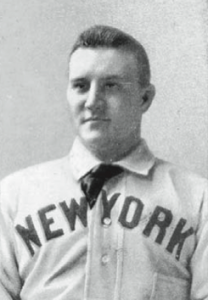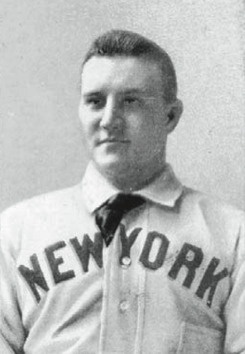May 7, 1894: A duel of aces as Giants’ Rusie bests Boston’s Nichols
 Although the Beaneaters’ May 7 game at the Polo Grounds against the New York Giants came early in the 1894 season, it would have been hard to find a more attractive matchup that year. Not only was the weather “ideal,” the starting pitchers were two of the game’s best, Charles “Kid” Nichols for Boston and Amos Rusie for the Giants.
Although the Beaneaters’ May 7 game at the Polo Grounds against the New York Giants came early in the 1894 season, it would have been hard to find a more attractive matchup that year. Not only was the weather “ideal,” the starting pitchers were two of the game’s best, Charles “Kid” Nichols for Boston and Amos Rusie for the Giants.
According to the New York Tribune, the two were “unlike as can be in physical and mental development.” Rusie was a “big, good-natured” fellow with “the speed of the wind and genuine snake like curves,” while his Boston counterpart, although “more delicate-looking,” had “plenty of speed, curves and superb control,” not to mention “plenty of gray matter under his cap.”1 Both pitchers were coming off 30-win seasons, but while Nichols was off to a fast start at 4-0, Rusie was only 1-3 thus far in 1894.
On this day, however, Nichols was operating at a disadvantage because of the absence of Herman Long, Boston’s starting shortstop. Long was out of the lineup due to his muff, not of a baseball, but rather “his inability to catch the unlighted end of a lighted cigar in his mouth” a few days earlier.2 Instead the stogie hit the foolhardy Long in the eye, fortunately doing no permanent damage, but causing injuries sufficient to keep him out of that day’s game. Filling in was future Hall of Famer Hugh Duffy, with pitcher Jack Stivetts taking Duffy’s place in the outfield.3 In spite of the game’s obvious box office appeal, attendance was limited to somewhere in the 3,500-to-7,500 range, not even 50 percent of the capacity of the Polo Grounds.4
Any fan who wanted to see some scoring had to be in his seat when Boston batted in the top of the first. After Rusie retired the first two batters without incident, he got ahead 0-and-2 on Stivetts before walking him, a mistake the New York Sun labeled both inexcusable and fatal.5 Even so, Rusie and the crowd must have thought the Giants were out of the woods when Tommy McCarthy hit a “towering fly” to John Montgomery Ward, the Giants shortstop and manager.6 Ward, however, “muffed it as if it had been a burning meteor,” putting Stivetts on third and McCarthy on first.7 After that, the Evening World declared, Ward “moved through the game trancelike.”
Unfortunately for Rusie and the Giants, that began with the very next play.8 Having tested the New York defense and found it wanting, McCarthy broke for second, drawing a throw from Giants catcher Charles “Duke” Farrell. Stivetts then took off for home and Ward compounded his earlier error with a throw that appeared to be “aimed at the upper tier of the grand stand.”9 Reprieved by the Giants leader’s second consecutive miscue, Stivetts gratefully “fell upon the rubber home plate like a ton of coal,” with a run that Tim Murnane, writing in the Boston Globe, claimed “loomed up as big as the Brooklyn bridge.”10
Although Boston repeatedly put men on base, Nichols’ offensive support was limited to that first-inning run. The Beaneaters’ best opportunity to increase their lead came in the eighth when they had men on second and third and only one out, but Billy Nash was thrown out at home to kill the rally. All told, Boston stranded 11 runners over the course of the game.11
After recounting the visitor’s missed opportunities, O.P. Caylor, writing in the New York Herald, told his readers, “Now I’ll tell you about the Giants batting, and it will not take much space to recite it,” especially since New York had only one hit in the first five innings.12 The Giants fans reportedly did everything they could to bring their heroes luck, but as the Sun noted, all their “mascots and lucky charms were dead letters.”13
However, the Giants’ fortunes revived in the bottom of the eighth when Eddie Burke hit a triple with one out, arriving at third “breathless but prouder than all the kings of Ireland.”14 All it would take to tie the game was a fly ball from Farrell, but the New York catcher grounded to shortstop. At least, however, he found the weak link in Boston’s makeshift defense and was rewarded when Duffy fumbled the ball. But Burke stayed where he was, setting up a debate between Caylor in the Herald, who thought “certainly he could have scored” and the Tribune reporter, who labeled such criticism “foolhardy.”15
In any event, the Giants still had the tying run 90 feet away with only one out and Rusie at the plate with a chance to help his own cause. The Giants pitcher responded with a “low liner” to right which Jimmy Bannon took on the run and made “a beauty” of a throw that Boston catcher Jack Ryan took on one hop and “cracked Mr. Burke on the back.”16
Although Boston had dodged that bullet, the Giants still had one more chance. With one out in the ninth, Yale Murphy reached on an error and then headed to second on the second pitch to Ward, perhaps anticipating a hit-and-run. It was the end of a not particularly good day for the future Hall of Famer as Caylor claimed, “Ward didn’t do a thing, but stood still,” and Murphy was easily thrown out at second. Sarcastically summing up the two men’s performance as “great team work that!”
Caylor’s comment also pretty much described the Giants’ lost afternoon.17 Needless to say, Ward and the final Giants hitter went out without further incident and the Giants left the field “with a beautiful coat of Boston whitewash.”18
Neither pitcher had cause to be ashamed of his day’s work. Rusie had allowed only six hits, but was betrayed by Ward’s two egregious errors, not just in one inning, but on two consecutive plays. After praising Rusie’s performance, the New York media was quick to criticize the rest of the team with Caylor colorfully noting that the Giants resembled a “balky team of horses, (making) believe they were trying to pull a loaded wagon out of the dirt.”19
Turning to Nichols, the Sun recalled predictions that the Boston pitcher would no longer “be a puzzle” because he had done too much pitching in California over the winter. Based on this performance, the paper suggested, all other pitchers should emulate him since Nichols “could not have been hit safely with a snow shovel.”20
Somewhat grudgingly (and ungraciously), Murnane, in the Boston Globe, acknowledged Rusie’s effort as “excellent work,” but rated him “a poor second to our own Kid Nichols, who pitched one of the greatest games of his life.”21 More sportsmanlike was the Boston Journal, which characterized Nichols’ performance as one of the “most notable exhibitions of steady and effective pitching in his triumphant career” without denigrating Rusie in the process.22
Although the Journal thought the “great pitchers’ battle” was “a game of a season,” surprisingly the New York papers couldn’t even agree on whether or not it had been a good game. The Tribune believed those in attendance had seen “a contest which will linger long in the memory of every one there,” but Caylor in the Herald caustically claimed that with only minor exceptions, the Giants “didn’t play intelligently enough to distinguish themselves from the lower order of animals which eat grass for a living.”23
Better days were ahead, however, for both Rusie and the Giants. The rival aces hooked up twice more during the season and Rusie emerged the winner both times on the way to winning 36 games, four more than Nichols. Perhaps even more impressively, the Giants finished ahead of Boston for the first time since 1889, just three games behind first-place Baltimore.
Notes
1 “Boston Scored One Little Run,” New York Tribune, May 8, 1894: 4.
2 “New Yorks Whitewashed,” Sun (New York, New York), May 8, 1894: 4.
3 O.P. Caylor, “Rusie Pitched a Great Game,” New York Herald, May 8, 1894: 13.
4 Caylor; “New Yorks Whitewashed”; “Ward’s Wretched Error,” New York Evening World, May 7, 1894, Fourth Edition: 1; “Boston Scored One Little Run”; Philip J. Lowry, Green Cathedrals: The Ultimate Celebration of Major League and Negro League Ballparks (New York: SABR and Walker & Co, 2006), 151.
5 “New Yorks Whitewashed.”
6 Caylor.
7 “New Yorks Whitewashed.”
8 “Baseball Chat,” Evening World, May 8, 1894 Fourth Edition: 1.
9 Caylor.
10 “New Yorks Whitewashed”; T.H. Murnane, “Battle Royal,” Boston Globe, May 8, 1894: 7.
11 Caylor; “Oh! John!,” Boston Journal, May 8, 1894: 3.
12 Caylor.
13 “New Yorks Whitewashed.”
14 “Ward’s Wretched Error.”
15 Caylor; “Boston Scored One Little Run.”
16 Murnane.
17 Caylor.
18 “New Yorks Whitewashed.”
19 Caylor.
20 “New Yorks Whitewashed.”
21 Murnane.
22 “Oh! John!”
23 “Oh! John!”; “Boston Scored One Little Run”; Caylor.
Additional Stats
New York Giants 1
Boston Beaneaters 0
Polo Grounds
New York, NY
Corrections? Additions?
If you can help us improve this game story, contact us.


